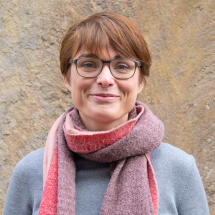Vita
My main interests as a medieval historian are the history of the family and the history of law. My work is centered mainly on the early and high Middle Ages. My current research focuses on illegitimacy in the German Middle Ages, especially regarding its various social, legal and cultural aspects. My previous research concentrated on the Pseudo-Isiodrian forgeries and on the significance of the papacy in particular. Furthermore, in my academic research and teaching I have worked on the relationship between the medieval church and the secular powers, the history of canon law and women in noble power structures.
since 2020 University of Cologne
Temporary Position for Principal Investigators, DFG-Project „Marginalien der Familie? Soziale und kulturelle Bedeutung von Illegitimität im hochmittelalterlichen Reich“2009 – 2020 University of Cologne
Research Associate at the Chair of Medieval History2009 – 2014 University of Cologne
Doctoral Studies of Medieval and Modern HistoryResearch Project
Illegitimacy in the clergy before the defectus natalium – From the exception to the rule?
The project is concerned with illegitimacy in the 9th and 10th century Frankish nobility. It centers on the diverse legal norms concerning illegitimacy and the increasingly standardized social practice of Frankish nobles caring for their bastard sons.
Until the end of the Carolingian Empire sons of the Frankish elite who were born out of wedlock entered the clergy only exceptionally. However, in the Frankish realms and in the kingdom of Italy in the 10th century, royal and noble families increasingly designated their bastard sons for a life in the clergy. As clerics they were simultaneously integrated into the domains of their fathers. At the same time, some clerical authors expressed legal and theological reservations against the ordination of men who were born out of wedlock. The research project with the Käte Hamburger Kolleg will use a comparative approach to describe this development and aims to put it into context with the history of illegitimacy in the Middle Ages.
Selected Publications
Harder, Clara, Tradition and Innovation. The Significance of the Bible in the Pseudo-Isidorian Forgeries, in: Heydemann, Gerda (Ed.), The Politics of Interpretation. The Bible and the Formation of Legal Authority in Early Medieval Europe - Bibelinterpretationen im Spannungsfeld der Politik. Die Bibel und Recht im frühmittelalterlichen Europa (Quellen und Forschungen zum Recht im Mittelalter) (accepted).
Harder, Clara, Art. Pseudo-Isidore, in: Routledge Medieval Encyclopedia Online (RMEO), ed. by Thomas F.X. Noble (accepted).
Harder, Clara, Chapter 19: Pseudo-Isidorus Mercator, in: Reynolds, Philip (Ed.), Great Christian Jurists and Legal Collections in the First Millenium, Cambridge 2019, 397-412.
Harder, Clara, Dimensionen hochmittelalterlicher Illegitimität. Heinrich der Löwe und seine "natürliche" Tochter Mathilde, in: Archiv für Kulturgeschichte 99 (2017), 341-370.
Harder, Clara, Der Papst als Mittel zum Zweck? Zur Bedeutung des römischen Bischofs bei Pseudoisidor, in: Ubl, Karl/Ziemann, Daniel (Ed.), Fälschung als Mittel der Politik? Pseudoisidor im Licht der neuen Forschung. Gedenkschrift für Klaus Zechiel-Eckes (MGH Studien und Texte 57), Wiesbaden 2015, 187-206.
Harder, Clara, Pseudoisidor und das Papsttum. Funktion und Bedeutung des apostolischen Stuhls in den pseudoisidorischen Fälschungen (Papsttum im mittelalterlichen Europa Bd. 2), Köln/Weimar/Wien 2014 (zugleich Diss. phil., Köln 2013).


